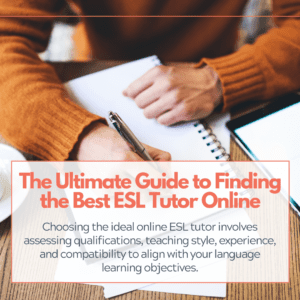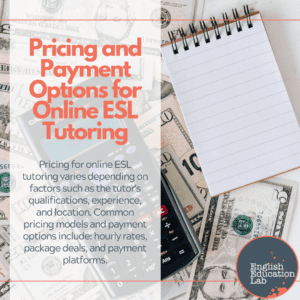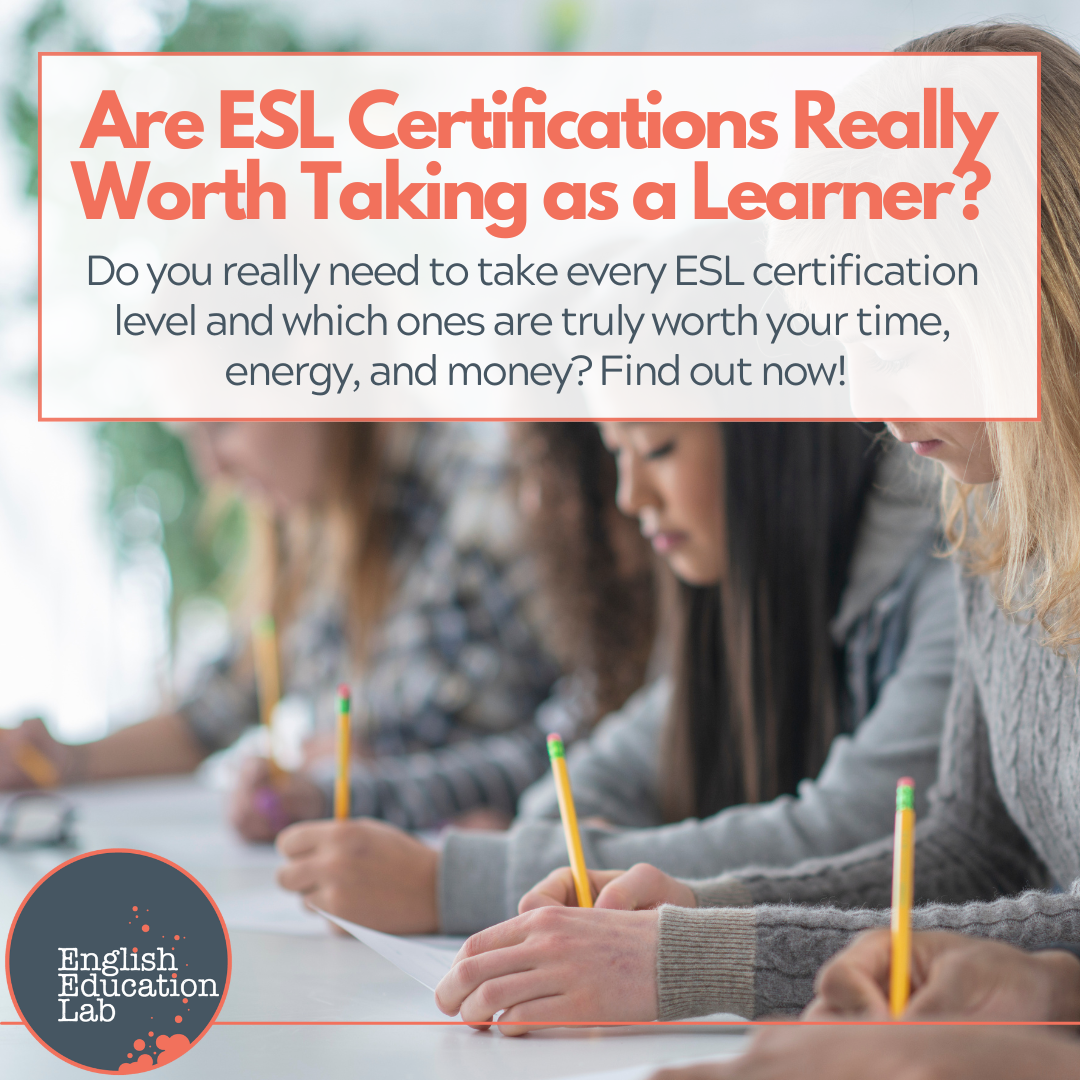
The ultimate guide to finding the best ESL tutor online
Are you looking to improve your English skills with the help of an ESL tutor? If so, you’ve come to the right place. In this post, I’ll walk you through the process of finding the best ESL tutor online and help you make an informed decision. Having an ESL tutor can make a world of difference in your language-learning journey. They can provide personalized instruction, catered to your specific needs and goals. With the convenience of online learning, you can now connect with qualified tutors from anywhere in the world, making it easier than ever to find the perfect match.

In this guide, we will explore the key factors to consider when selecting an ESL tutor, including their qualifications, teaching approach, and experience. I’ll also provide you with tips on how to make the most of your online tutoring sessions and resources to help you find tutors who align with your specific needs, goals, and expectations. If you’re eager to begin or continue your language learning journey, keep reading!
The importance of finding the right ESL tutor
Finding the right ESL tutor is crucial for your language learning success. A qualified and experienced tutor can help you overcome challenges, improve your language skills, and boost your confidence. They can provide personalized instruction tailored to your specific needs and goals, ensuring efficient and effective learning.
One of the key advantages of having an ESL tutor is the opportunity to receive individual attention. In a traditional classroom setting, teachers often have to divide their focus among multiple students, making it challenging to address each student’s unique needs. However, when working with an ESL tutor, you can have one-on-one sessions where the focus is solely on you. This personalized attention allows for targeted instruction and faster progress and who doesn’t want that?!
Additionally, an ESL tutor can provide valuable feedback and guidance. They can identify your strengths and weaknesses, help you improve your pronunciation, grammar, and vocabulary, and guide you towards resources that will further enhance your learning. Their expertise and experience in teaching English as a second language can make a significant difference in your language acquisition journey.
Factors to consider when choosing an online ESL tutor
When selecting an online ESL tutor, there are several important factors to consider. These factors will help you determine whether a tutor is the right fit for you and your language learning goals. Here are sthe key factors to keep in mind:
Qualifications: Look for tutors with relevant qualifications, such as a degree in English, TESOL certification, or teaching experience. These qualifications indicate that the tutor has the necessary knowledge and skills to guide you effectively.
Teaching approach: Different tutors have different teaching approaches. Some may focus on grammar drills and exercises, while others may prioritize conversational practice. Consider your learning style and preferences to find a tutor whose teaching approach aligns with your needs.
Experience: Experience plays a significant role in a tutor’s effectiveness. Experienced tutors have likely encountered a wide range of students and can adapt their teaching methods to suit different learning styles. Look for tutors with a proven track record of success.
Availability and flexibility: Ensure that the tutor’s schedule aligns with yours to avoid conflicts. Additionally, consider their flexibility in adapting to your learning pace and adjusting the curriculum based on your progress.
Compatibility: Building a rapport with your tutor is essential for effective learning. Consider factors such as communication style, personality, and teaching methods to ensure compatibility with your tutor.
By considering these factors, you can narrow down your options and find an online ESL tutor who meets your specific requirements.
Types of online ESL tutors
When searching for an online ESL tutor, you will come across various types of tutors. Understanding the different options available will help you choose the one that best suits your learning style and preferences.
Native English speakers: Native English speakers are tutors who have grown up speaking English as their first language. They have an innate understanding of the language and can provide authentic language input. They can help with natural conversation skills, idiomatic expressions, and cultural nuances.

Non-native English speakers: Non-native English speakers are tutors who have learned English as a second language themselves. They have gone through the process of learning English and can relate to the challenges you might face as a non-native speaker. They can provide valuable insights and strategies based on their own learning experiences.
Certified ESL teachers: Certified ESL teachers have completed specific training programs to teach English as a second language. They have in-depth knowledge of language acquisition theories, teaching methodologies, and assessment techniques. Working with a certified ESL teacher ensures that you receive instruction from a qualified professional.
Specialized tutors: Specialized tutors focus on specific areas of English language learning, such as business English, academic English, or test preparation (e.g., TOEFL, IELTS). If you have specific language goals or require specialized instruction, working with a tutor who specializes in your area of interest can be highly beneficial.
Researching and comparing online ESL tutors
Once you have identified the key factors to consider, it’s time to start researching and comparing online ESL tutors. Here are some steps to follow during this process:
Online platforms and websites: Start by exploring online platforms and websites that connect language learners with tutors. Popular platforms include iTalki, Preply, and Verbling. These platforms provide detailed tutor profiles, reviews, and ratings, making it easier to compare tutors.
Read tutor profiles: Take the time to read through tutor profiles to get a sense of their qualifications, teaching experience, and areas of expertise. Look for tutors who align with your learning goals and preferences. Take your time here!
Read reviews and testimonials: Reviews and testimonials from previous students can provide valuable insights into a tutor’s teaching style, effectiveness, and professionalism. Look for consistent positive feedback and consider any concerns or criticisms raised!
Contact tutors: Reach out to potential tutors to ask any specific questions or clarify any doubts you may have. This direct communication will give you a better understanding of the tutor’s responsiveness and ability to address your concerns. A tutor worth their salt should be open and willing to answer any and every question or concern you may have.

Trial lessons: Many tutors offer trial lessons at a reduced rate or even for free. Use this opportunity to assess the tutor’s teaching style, approach, and compatibility. Pay attention to your learning experience to determine if the tutor meets your needs. The tutor should answer your questions, provide insight into their teaching methodology, and demonstrate flexibility in adapting to your learning style and goals. Evaluate their communication skills, patience, and ability to provide feedback. This trial period allows you to determine if the tutor’s approach aligns with your preferences and if you feel comfortable and motivated during the lesson.
By conducting thorough research and comparing tutors, you can make an informed decision and choose the best online ESL tutor for your needs.
Questions to ask potential online ESL tutors
When contacting potential online ESL tutors, it’s important to ask relevant questions to gauge their suitability. Here are some questions you can ask to gather more information:
What is your teaching experience?: Inquire about the tutor’s teaching experience, including the number of years they have been teaching and the types of students they have worked with. This will give you an idea of their expertise and ability to cater to different learner needs.
What teaching methods do you use?: Inquire about the tutor’s pedagogical strategies and methodologies. Ask questions on their approach to teaching, exploring their emphasis on conversation practice, grammar instruction, and any additional elements such as vocabulary building, listening comprehension, and cultural immersion integrated into their lessons.
It’s crucial to ascertain whether their teaching methods align not only with your learning goals but also with your preferred learning style. By gaining insight into their approach, you can better determine if the tutor is equipped to address your specific needs and facilitate your language learning journey effectively.
How do you tailor lessons to individual students?: When discussing with a tutor how they tailor lessons to students, inquire about their approach to personalized instruction. A good tutor will assess the student’s needs, create customized lesson plans, adapt teaching strategies to suit the student’s learning style, use varied teaching methods, and regularly assess progress to ensure effectiveness. Look for a tutor who can provide individualized support to help you achieve your learning goals.
What resources do you use in your lessons?: Inquire about the resources the tutor incorporates into their lessons. Do they use textbooks, online materials, and multimedia resources, or do they create their own resources? Consider whether these resources align with your learning preferences.
What is your availability?: When inquiring about a tutor’s availability, it is important to assess whether their schedule aligns with yours to ensure a smooth and consistent learning experience. You can start by asking about their availability for regular lessons, such as specific days and times they are typically free to conduct tutoring sessions.
Additionally, it is helpful to discuss any potential conflicts that may arise in the future. This could include events or commitments that may interfere with scheduled lessons, so both you and the tutor can plan accordingly to address those situations in advance. By having a clear understanding of the tutor’s availability and any potential scheduling conflicts, you can better plan and manage your learning sessions effectively.
Asking these questions will help you assess the tutor’s suitability and ensure that they can meet your specific learning requirements.
Evaluating the qualifications and experience of online ESL tutors
When evaluating the qualifications and experience of online ESL tutors, it’s important to consider the following:
Education and certifications: Look for tutors with relevant education, such as a degree in English or a related field. Additionally, certifications such as TESOL or TEFL indicate that the tutor has received formal training in teaching English as a second language.
Teaching experience: Consider the tutor’s teaching experience, including the number of years they have been teaching and the types of students they have worked with. Experienced tutors are more likely to be equipped with effective teaching strategies and have a better understanding of learner needs.
Specializations: Some tutors have specialized in specific areas, such as business English, academic English, or test preparation. If you have specific language goals, consider working with a tutor who specializes in your area of interest.

Continuing professional development: Tutors who actively engage in continuing professional development demonstrate a commitment to staying up to date with the latest teaching methodologies and strategies. Look for tutors who participate in workshops, conferences, or online courses to enhance their teaching skills.
By evaluating the qualifications and experience of online ESL tutors, you can ensure that you are working with a knowledgeable and experienced professional.
The role of technology in online ESL tutoring
Technology plays a crucial role in online ESL tutoring. Here are some ways in which technology enhances the learning experience:
Video conferencing: Video conferencing platforms such as Skype, Zoom, or Google Meet enable face-to-face interaction between the tutor and the student, regardless of their geographical location. This allows for real-time communication and personalized instruction.
Interactive whiteboards: Online whiteboard tools allow tutors to share teaching materials, write and highlight important points, and collaborate with students in real-time. These interactive whiteboards simulate the traditional classroom experience and facilitate active learning.
Digital resources and materials: Online ESL tutors have access to a vast range of digital resources, including e-books, online exercises, multimedia materials, and interactive activities. These resources can enhance the learning experience and make lessons engaging and interactive.
Instant messaging and file sharing: Instant messaging platforms and file-sharing tools enable tutors to easily communicate with students, share additional resources, or provide feedback outside of scheduled lesson times. This enhances the tutor-student relationship and supports continuous learning.
The use of technology in online ESL tutoring opens up a world of possibilities, providing students with convenient access to quality instruction and resources.
Pricing and payment options for online ESL tutoring
Pricing for online ESL tutoring varies depending on factors such as the tutor’s qualifications, experience, and location. Here are some common pricing models and payment options to consider:
Hourly rates: Many tutors charge hourly rates for their lessons. Hourly rates can vary significantly depending on factors such as the tutor’s credentials, experience, and specialization. Consider your budget and the value that the tutor provides when evaluating hourly rates.
Package deals: Some tutors offer package deals, where you can purchase multiple lessons in advance at a discounted rate. This can be a cost-effective option if you are committed to regular learning and want to save money in the long run.
Payment platforms: Online platforms that connect tutors and students often provide secure payment options. These platforms handle payment transactions, ensuring that both parties are protected. Payment options usually include credit cards, PayPal, or other online payment methods.

Consider your budget and learning goals when evaluating the pricing and payment options for online ESL tutoring. Remember that investing in quality instruction can yield significant long-term benefits.
Testimonials and reviews of online ESL tutors
Testimonials and reviews from previous students can provide valuable insights into the effectiveness and professionalism of online ESL tutors. When reading testimonials and reviews, consider the following:
Consistency: Look for consistent positive feedback across multiple reviews. This indicates that the tutor consistently delivers high-quality instruction and meets student expectations.
Specificity: Pay attention to specific details in the testimonials and reviews. Look for mentions of how the tutor has helped students overcome specific challenges or achieve specific language goals. This demonstrates the tutor’s ability to cater to individual student needs.
Relevance: Consider the relevance of the testimonials and reviews to your own learning goals and preferences. Look for reviews from students who have similar language learning objectives or requirements.
Keep in mind that testimonials and reviews should be used as a reference. Ultimately, it’s important to have direct communication with potential tutors and assess their suitability based on your specific needs.
Final thoughts
Finding the perfect ESL tutor online requires careful consideration of various factors. By evaluating qualifications, teaching approach, experience, and compatibility, you can select a tutor who meets your specific language learning goals.
Thorough research and comparison of online ESL tutors, along with direct communication and trial lessons, will help you make an informed decision. Take advantage of the technology available for online ESL tutoring and consider pricing options and payment platforms that align with your budget and preferences.
Remember, investing in the right ESL tutor can greatly enhance your language learning journey and bring you closer to achieving your English language goals. So take the first step, explore the available options, and embark on a rewarding learning experience with your ESL teacher!
Get your ‘Free Cheat Sheet on Understanding the English Articles’ here!
Get your ‘Free Guide to Speaking English with Confidence- Your 5-Step Roadmap’ here!
Subscribe to my YouTube Channel!
Further Reading
Unlocking the doors to success with online ESL classes for adults
Unleashing your potential through learning English as a second language
Mastering the art of intonation: A guide to effective communication
From above to below: Understanding the different prepositions of place
Demystifying the present perfect tense: From confusion to clarity
Social media slang: Boost your online communication skills with these must-know terms



